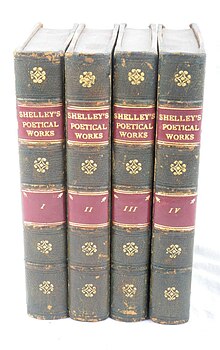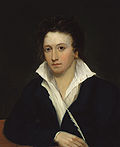England in 1819
ENGLAND IN 1819An old, mad, blind, despised, and dying king,—
Princes, the dregs of their dull race, who flow
Through public scorn, mud from a muddy spring,—
Rulers who neither see, nor feel, nor know,
But leech-like to their fainting country cling,
Till they drop, blind in blood, without a blow,—
A people starved and stabbed in the untilled field,—
An army which liberticide and prey
Makes as a two-edged sword to all who wield,—
Golden and sanguine laws which tempt and slay;
Religion Christless, Godless, a book sealed,—
A Senate—Time's worst statute unrepealed,—
Are graves from which a glorious Phantom may
Burst to illumine our tempestuous day.
"England in 1819" is a political sonnet by the English Romantic poet Percy Bysshe Shelley which reflects his liberal ideals.[1]
Background
[edit]The poem was composed in 1819, but it was not published until 1839 in the four-volume The Poetical Works of Percy Bysshe Shelley (London: Edward Moxon) edited by Mary Shelley. Maintaining typical sonnet structure, "England in 1819" has fourteen lines and is written in iambic pentameter, but its rhyming scheme (ABABAB CDCD CCDD) differs from that of the traditional English sonnet (ABAB CDCD EFEF GG).
Summary
[edit]The sonnet describes a very forlorn reality. The poem passionately attacks, as the poet sees it, England's decadent, oppressive ruling class. King George III is described as "old, mad, blind, despised, and dying".[2] The "leech-like" nobility ("princes") metaphorically suck the blood from the people, who are, in the sonnet, oppressed, hungry, and hopeless, their fields untilled. Meanwhile, the army is corrupt and dangerous to liberty, the laws are harsh and useless, religion has lost its morality, and Parliament (the "Senate") is a relic. In addition, the civil rights of the Catholic minority are non-existent "Time's worst statute unrepealed". In a startling burst of optimism, the last two lines express the hope that a "glorious Phantom" may spring forth from this decay and "illumine our tempestuous day".
This poem was written as a response to the brutal Peterloo Massacre in August 1819.[3]

References
[edit]- ^ Phillips, Brian. SparkNote on Shelley's Poetry. 18 August, 2007.
- ^ Chandler, James. England in 1819: The Politics of Literary Culture and the Case of Romantic Historicism. Chicago, IL: The University of Chicago Press, 1998.
- ^ Boynton, Owen (8 October 2024). "Percy Shelley's "England in 1819" | The Andrea Mitchell Center for the Study of Democracy, University of Pennsylvania". amc.sas.upenn.edu. Retrieved 8 October 2024.
Sources
[edit]- Chandler, James. England in 1819: The Politics of Literary Culture and the Case of Romantic Historicism. University of Chicago Press. 1998.
- Cox, Jeffrey N. Poetry and Politics in the Cockney School: Keats, Shelley, Hunt and their Circle (Cambridge Studies in Romanticism). Cambridge University Press, 2004.
- Duff, David. Romance and Revolution: Shelley and the Politics of a Genre (Cambridge Studies in Romanticism). Cambridge University Press, 2005.
- Jost, François. "Anatomy of an Ode: Shelley and the Sonnet Tradition." Comparative Literature, Vol. 34, No. 3 (Summer, 1982), pp. 223–246.
- Phillips, Brian. SparkNote on Shelley's Poetry. 18 Aug. 2007.
- MacEachen, Dougald B. CliffsNotes on Shelley's Poems. 18 July 2011.
- Rumens, Carol. "Poem of the week: England in 1819: This week, a furious sonnet from Shelley whose attack on the ruling classes retains its power two centuries on." Guardian, 23 February 2009.
- Stock, Paul. The Shelley-Byron Circle and the Idea of Europe (Palgrave Studies in Cultural and Intellectual History). Palgrave Macmillan, 2010.
- Vivante, Leone. "Shelley and the Creative Principle" in Shelley. Ed. George Ridenour. Englewood Cliffs: Prentice-Hall, 1965.
- Wasserman, Earl. Shelley: A Critical Reading. Baltimore: Johns Hopkins Press, 1971.
- Wasserman, Earl. The Subtler Language. Baltimore, Johns Hopkins Press, 1959.
- Wheatley, Kim. Shelley and His Readers: Beyond Paranoid Politics. University of Missouri, 1999.
- Wroe, Ann. Being Shelley: The Poet's Search for Himself. Pantheon, 2007.

